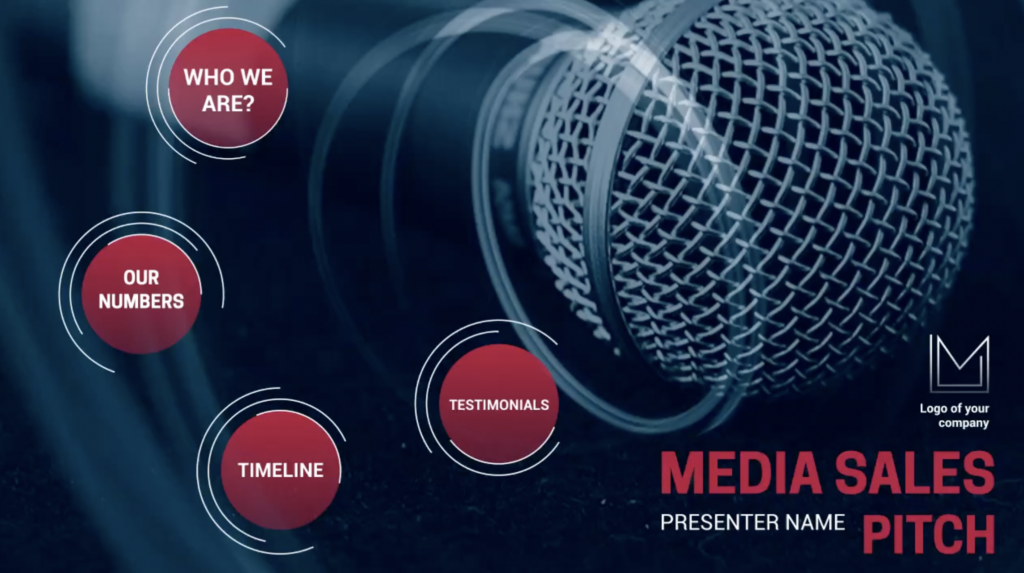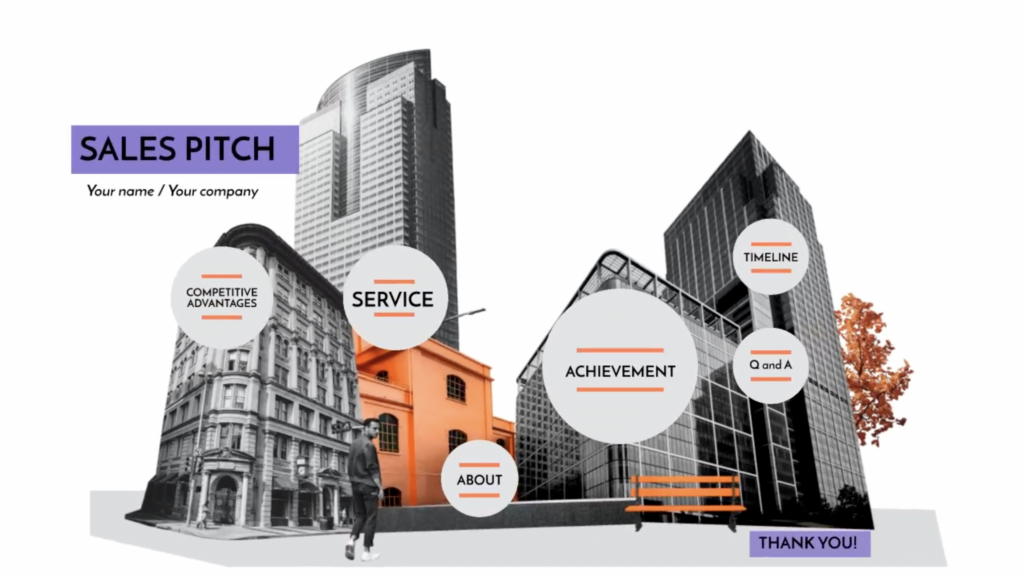Like what you're reading?

How to create a successful pitch deck presentation
Get your team on prezi – watch this on demand video.
Anete Ezera December 18, 2023
When it comes to startups and entrepreneurs, getting that first big deal can be tricky. It can be hard to put your business idea forward in a way that’s going to convince potential investors or partners. This is where pitch deck presentations come in handy as they are often short and precise. The goal is to explain your idea in a way that gets straight to the point and is easy to understand. These quick, punchy presentations are critical for those looking to make a strong first impression and secure funding for their business venture. Let’s talk about what a pitch deck is and how you can create one with the help of Prezi .

What is a pitch presentation?
To get a better understanding of what a pitch deck presentation really is, let’s look at some of the important elements that make one:
Conciseness: It’s typically short, usually 10-20 slides. This fast pace enables the presenter to captivate the audience and maintain attention.
Clarity: The aim is to keep the content clear and straightforward, avoiding complicated jargon so that the message is understood.
Powerful storytelling: It will often tell an interesting story about the problem being solved, the solution offered, and the potential market opportunity.
Key information: Because of its fast-paced nature, it will often be packed with vital information like the business model, financial projections, and the unique value proposition of the product or service being pitched.
Appealing visuals: Like other styles of presentation, having visuals that can draw in the audience is a must. Pitch deck presentations will often use graphics and minimal text to convey information better.
To get a visual understanding of what a pitch presentation is, explore the following pitch presentation:
What is the purpose of a pitch deck?
A pitch deck isn’t just about communicating business ideas but is a critical medium for storytelling, convincing other people, and forging connections. It’s meant to give a presentation of your business or idea in an informative yet interesting way. A pitch deck creates an emotional connection with investors or partners by showing them the unique solutions your venture offers to their problems and how it will be profitable. Good pitch decks initiate the dialogue that creates trust and can bring about critical funding and partnerships.
The evolution of pitch deck presentations: a look back and ahead
Ever wondered how pitch decks became such a big deal? They started as simple PowerPoint slides but have evolved into something much more dynamic. This journey reflects changes in business, technology, and what investors look for. In the early days, pitch decks were pretty straightforward – just a few slides outlining a business idea.
But as technology advanced, so did the expectations. Now, we see pitch deck presentations with interactive elements, attractive visuals, and even storytelling elements. This evolution shows how we’ve learned to communicate complex ideas more effectively. Understanding this history helps us understand how pitch decks have evolved into what they are today.
Is a pitch deck the right presentation style for me?
A pitch deck is perfect if you’re looking to present a business idea, especially if you’re aiming to attract investors or partners. It’s designed to be concise yet impactful, focusing on the key aspects of your business or project. Think of it as showcasing your business- you’ve got a limited amount of time to make a strong impression. So, if you’re in the early stages of a startup, seeking funding, or trying to win over some stakeholders with a clear, compelling story about your business or idea, a pitch deck could be just what you need.

People who might also benefit from pitch deck presentations
Pitch decks are a versatile tool that can greatly benefit a wide range of individuals and organizations. We’ve discussed the role of pitch decks for startups and entrepreneurs, so let’s look at some other instances where these presentations might be particularly useful:
- Business executives : Established business owners can use pitch decks to propose new projects or strategies to stakeholders, boards, and investors.
- Sales and marketing professionals : To pitch products or services to potential clients or partners, highlighting their unique selling points.
- Non-profit organizations : For presenting their mission, impact, and funding needs to donors, sponsors, or grant agencies.
- Researchers and academics : To secure funding or collaboration for research projects, especially when presenting to funding bodies or at academic conferences.
- Inventors and innovators : To attract investors, partners, or attention to their new inventions or innovations.
- Freelancers and consultants : To pitch their services and unique value proposition to potential clients or agencies.
What makes a good pitch deck presentation?
When we talk about pitch decks, it’s important to compare the differences between a great pitch deck and the ones that just don’t hit the mark.
What does a pitch deck look like?
A successful pitch deck should have a clean, uncluttered design. This way your audience can take in the information without being distracted by over-complicated slides. Any images used should be of high quality, and be relevant to the text. A pitch deck presentation should flow logically, so the information provided tells a story about what you’re aiming to achieve.
The colors used should match that of your brand, often logos and fonts will correspond with the theme of the brand, organization, or company. This is a great way to reinforce who you are and what you stand for. A good pitch deck will captivate the audience by using each slide to convey a single key point, this way, the message is concise and easily absorbed.
Pitfalls to avoid
Now, let’s talk about what a pitch deck shouldn’t look like. If you want to entice your audience, don’t cram too much information onto your slides . This is going to overwhelm your audience and make their attention span drop. Don’t stray away from key points by including irrelevant information. You want your pitch deck to persuade people to take action and have faith in you and your product, so don’t go off on a tandem.
Use a language tone that’s relatable to everyone – don’t use overly technical terms or industry-specific jargon. This can be off-putting for potential investors who don’t work in your field. One of the biggest mistakes you could make is to be inconsistent with your theme, color, and fonts. Remember, the idea is to appear professional.

Things to consider when preparing to create your pitch deck presentation
Although it might be appealing to dive straight into making your presentation, there are certain points you should consider to get the best out of your pitch deck. Here are some things to think about when planning:
Know your audience
Consider who you’re presenting to and include criteria that are going to be appealing to them. For instance, what resonates with venture capitalists may be different from what appeals to potential partners or customers.
Engaging storyline
When thinking about what to include in a pitch deck, the first thing you should consider is your narrative. You want to hold your audience’s attention throughout the whole presentation, so tell your story in a way that builds anticipation and makes them want more.
Keep each slide simple. Your audience will respond better to clear, concise content that’s not too busy and complicated. Keep text easily readable and appropriate for all levels of knowledge.
Key messages
Plan out the purpose of each slide beforehand, that way you can be sure the key messages come across well.
You can include things like graphs or charts to simplify complex data, but do this in a way that doesn’t overcrowd the slides. Remember to stay consistent with colors and fonts to reinforce clarity.
Data and validation
Do your research when preparing to make your pitch deck presentation. It’s crucial to back up your claims, such as market research, growth projections, or case studies. Using real-world examples is a good way to back up your credibility.
Business model
Think about how you’re going to explain your business model in a way that comes across clearly. Always be honest about your revenue streams, pricing strategies, and your position in the market.
Investors often invest in people as much as they do ideas, so think about how you can highlight the strengths of yourself and your team.
You need to clearly state what you’re asking for. Whether it’s funding, support, or a partnership, make sure your audience knows what you need from them.
Practice your pitch deck so that it flows well and fits with the time constraints. Rehearsals are great for realizing flaws, which means you can rectify where needed to ensure the best possible pitch on the day. Be prepared to answer questions and address potential concerns- you can do this by listing some possible queries and preparing an adequate answer.
Beginning and ending
How can you draw the audience in from the minute you start speaking? A successful pitch deck presentation often starts with a bang, such as a powerful punch line, a vibrant image, or a brain teaser. When it comes to ending your pitch, summarize the main points and offer a chance for discussion.
Discover other crucial and noteworthy tips on creating and delivering pitch presentations by watching the following video:
Specialized pitch decks: tailoring your presentation to your industry
Creating a successful pitch deck requires understanding the unique aspects of your industry. Here’s how to tailor your pitch deck across six different sectors:
When learning how to make a pitch deck for film, focus on your storyline, target audience, and potential marketing strategies. Include visuals like storyboards or mood boards to convey the cinematic style and tone of the film.
Consider using the Media and Entertainment Pitch Template to effectively present these elements.

Technology
For a tech pitch deck, emphasize innovation, scalability, and market need. Highlight key technological advancements, patent status, and how the technology solves a significant problem.
The Technology Pitch Template is ideal for showcasing cutting-edge technology solutions.

Healthcare pitch decks should outline the impact of the product or service on patient care, compliance with regulations, and potential healthcare partnerships. Focus on evidence-based outcomes and market analysis.
Use the Healthcare Pitch Template to structure your presentation around these key points.

In retail, your pitch deck should showcase market trends, customer demographics, and competitive analysis. Highlight unique selling points, marketing strategies, and supply chain logistics.
The Retail Pitch Template can help you effectively communicate these aspects.

Educational pitch decks need to focus on educational outcomes, curriculum innovation, and instructional methods. Include potential partnerships, endorsements from educational leaders, and user testimonials.
The Connections and Networking Pitch Template can be adapted for educational presentations to highlight these collaborations and innovations.

Real Estate
For real estate, the pitch should cover market analysis, property details, investment opportunities, and projected returns. Use high-quality images and maps to provide a clear view of the property and its benefits.
The City and Urban Development Pitch Template is perfect for these types of presentations.

Each of these industries needs a different focus. But the goal remains the same- to clarify what the value and potential of your project actually are. Whether you’re figuring out how to write a pitch deck, or you’re in the process of refining your existing one, make sure that this presentation really resonates with your audience.
How to do a competitor analysis pitch deck
One of the most critical elements of your pitch deck is to demonstrate to investors- through a very strong competitor analysis- that you’ve not only become familiar with the market but also figured out how to outperform others in your industry. So first, identify your key competitors and what they execute well and where they’re going wrong. That way, you can properly show how your company provides a new and better way of solving similar problems in the market.
Use your competitor analysis to really drive home your competitive edge. Showcase prominently what makes your product, service, or business model better than the others and where you’re covering certain market gaps which others might have ignored. This acts in building trust with the investors and also sets you apart as a strategic player within your industry.
How to show competitor analysis in a pitch deck
It’s one thing to know how to show competitor analysis in a pitch deck, but it’s another to actually do it in a way that drives home your comparison with force. The most effective presentations use charts, graphs, or tables that provide a parallel comparison between your business and the competition. These visual aids are very good at breaking down complicated information into easily digestible insights. By using visuals to show competitor analysis, investors will quickly appreciate the advantages your start-up has to offer.
For example, you could create a table that compares features, pricing, market share, and customer satisfaction, all of which visually highlight your strengths over competitors. Keeping this analysis simple and straightforward ensures that your audience can easily see why your business is the better choice.
Presenting your pitch deck presentation
Your presenting skills must be just as effective as the pitch deck you’ve created. Imagine spending all that time and effort on making each slide perfect, to go and blow your opportunity by poorly presenting it. Here are some tips to help you own the stage for your pitch deck:
Body language
- Posture: Stand tall and proud. A good posture reflects confidence and keeps you physically engaged.
- Gestures: Gestures should be natural and purposeful. For example, you might use hand gestures to emphasize important points. Avoid being overly dramatic with gestures as this can be distracting.
- Movement: Moving can add energy to your presentation, but be careful not to pace around the stage, as this can make you appear nervous. A simple step forward when you’re reaching the punchline of your story can elevate impact. Similarly, turning your body to face different sections of the audience can make everyone feel included.
Facial expressions
- Eye contact: Make eye contact with your audience, and maintain it. Don’t just focus on one area, move your gaze around the room to add a personal element to your presentation. This is going to help you build a connection and keep them engaged.
- Smiling: Smile where appropriate. This is going to make you seem approachable and passionate about your subject. However, you don’t want to unnerve your audience by wearing a forced smile throughout the whole presentation.
- Expressiveness: Your facial expressions should match the tone of what you’re saying. They can be a powerful way of transporting emotions from the screen onto the audience.

Voice control
- Volume: You want everyone in the room to hear you, so speak loudly, but avoid shouting.
- Pace: Remember that your audience needs to clearly hear every word for maximum impact, you can do this by keeping a moderate pace throughout. Speaking too fast can be hard to keep up with, and talking too slowly can become boring.
- Tone: Use a varied tone to maintain interest, as monotone speech can be disengaging. For instance, you could change the pitch and intensity of your tone when discussing something positive or exciting.
- Duration: Stick to the allotted time for your pitch deck presentation. Running too long can lose your audience’s interest, while cutting it too short may not deliver enough information.
- Pauses: Pauses are handy for creating suspense, or allowing key points to sink in. They can also be helpful for a smooth transformation from one topic to another.
Dealing with nerves
- Practice: The more familiar you are with your content, the less nervous you’re going to be. Practice your body language cues, speaking clearly, and using the right facial expressions.
- Visualization: Envision a successful pitch deck presentation. It’s when we worry about the things that could go wrong that causes anxiety to kick in.
- Relaxation techniques: Before taking the stage, simple techniques can help with nerves, such as mindfulness practices and progressive muscle relaxation.
- Deep breathing: Practice deep breathing to control nerves and keep a steady voice. This helps in delivering a calm and confident pitch.
If you’re struggling with nerves, watch the following video on how to not be nervous for a presentation:
Audience interaction
- Question prompts: To make your pitch presentation more interactive, encourage audience participation and questions.
- Read the room: Always be aware of the audience’s reactions and adjust accordingly. If they seem disinterested, you might need to change your approach or pace.
As a pitch deck presenter, your role is to deliver your content in a way that makes an impact. Mastery of body language, voice, and timing all play a crucial role in yielding the results you want.
Prezi: Your tool for creating pitch deck presentation
If you’re aiming to create a pitch deck that sets you apart from competitors, Prezi is the tool for you. Here’s why:
Unique presentation style
Unlike traditional slide-by-slide presentations, Prezi allows you to create a more fluid and dynamic pitch deck. You can move freely around the canvas, zooming in on details and out to the bigger picture. This helps in structuring your pitch deck presentation in a way that best suits your story, making it more engaging for your audience.
Zooming user interface
This is one of Prezi’s signature features. You can zoom in to focus on specific details and zoom out to show the overall context of your idea. Since pitch decks are all about emphasizing key points, this feature is essential.
Visual storytelling
The best way to tell a story through your pitch deck presentation is to turn complicated information into digestible parts. With Prezi, you can use appealing visuals to simplify ideas and make data easier to interpret. Prezi supports images, visuals, graphics, and animations, so you can create a pitch that captivates your audience.
Experience visual storytelling in action in a Prezi presentation:
Templates and customization
Prezi offers a variety of templates , which can be a great starting point for your pitch deck presentation. These templates are fully customizable, meaning you can align the design with your brand’s look and feel.
As an example, take a look at this product launch template by Prezi. This would be a solid choice for a pitch deck presentation, particularly if you’re about to launch a new product or service. It provides a structured layout that guides you through the essential elements of a pitch. If you’re hoping to make a good impression, the design of this template looks clean and professional while focusing on key points. It allows you to highlight what sets your product apart in a compelling way.
Like most Prezi templates, it offers customization options. You can tweak colors, add your images, and moderate the content to align with your brand and product. These are all essential elements for creating a personalized and relevant pitch deck.

Collaboration tools
Prezi’s collaboration features come in handy when you’re working with a team. Multiple people can work on the pitch deck presentation at the same time, offering valuable inputs and different ideas. This way, your pitch deck can reach its full potential. If you like to delegate tasks and give each team member a role in the creation, this feature is great for coordinating efforts.
Prezi Video
For remote pitching, Prezi Video is the perfect solution as it allows you to add a video of yourself presenting alongside your content. This enables you to make your pitch just as personal as it would be in person.
To explore how Prezi Video works, watch the following video:
Path tool for story flow
To help create a natural flow for your story, Prezi lets you set paths to move between topics. This easily guides your audience through your presentation in a logical way, which is crucial when it comes to pitch decks.
Prezi AI: essential for every pitch deck presentation
Prezi is at the forefront of the AI revolution, enhancing your pitch decks with advanced AI tools . Alongside AI text editing, which refines your wording for clarity and impact, Prezi AI now offers comprehensive layout suggestions that adapt to your unique content style. Additional features include:
Automatic design
Prezi AI’s automatic design feature smartly adjusts the visual elements of your pitch deck to match your content. This means your presentation will always look polished and professional, perfectly aligned with your brand’s style. It’s a huge time-saver, freeing you up to focus more on content than aesthetics. This way, you ensure your pitch deck not only looks great but also resonates with your intended audience.
Smart customization
With smart customization, Prezi AI offers design choices that specifically improve the message of your pitch deck. This tool adapts to the theme and goals of your presentation, providing options that keep your design consistent yet distinct. This level of customization ensures your pitch stands out in a sea of standard presentations, making a memorable impact on your audience.
Interactive elements
Prezi AI seamlessly embeds interactive elements, so that your audience will find complex data easy to understand. These interactive tools turn boring static presentations into dynamic experiences that grab the attention of the audience. It’s an important tool for presenting a pitch deck that carries information in an interesting yet understandable way.
Efficiency boost
Prezi AI boosts efficiency by quickly turning basic ideas into fully realized pitch decks. This acceleration in the creation process allows you more time to fine-tune and perfect your presentation’s content and delivery. By streamlining these initial steps, Prezi AI ensures that you can devote your energy to what really matters: crafting a compelling pitch that effectively communicates your vision.
These tools ensure your pitch remains personal yet professionally appealing. Discover more about Prezi AI features here .
Successful business pitch deck examples
Many well-known companies famously used pitch decks in their early stages to secure funding and partnerships. Here’s some you may know:
Back in 2008, Airbnb was just starting out and needed funding, so they created a pitch deck. This wasn’t just any pitch deck—it was really clear and straightforward, showing off their business model and what they hoped to achieve. They ended up raising $600k from an angel investment round. Their pitch presentation was so successful that people still talk about it today. It’s a classic example of how a good pitch can really set a company on the path to success.
Did you know about Uber’s beginnings? On their ninth anniversary, Garrett Camp, one of the co-founders, shared their first pitch deck. It was a 25-slide presentation that they used way back when they were just starting out. This pitch presentation was a major part of their strategy and really helped in the company’s early growth and evolution. It’s pretty impressive to think how those early slides contributed to making Uber the giant it is today.
We all know how significant Facebook is when it comes to social media platforms, but it’s all down to their original pitch presentation back in 2004 that propelled them into such success. The pitch deck contained mix-and-match slides for summarizing Facebook’s value proposition, key metrics, and audience demographics. Shortly after the launch of facebook.com, Eduardo Saverin, who was 21 at the time, took their presentation to New York. He was there to pitch Facebook’s Ad platform to potential clients. Now, fast forward to today, Facebook for Business has grown massively. It’s the second biggest digital advertising platform, just behind Google, and holds more than 25% of the market share.
These examples are not only inspirational but show just how important pitch deck presentations are. A strong pitch is critical for making a good first impression, forming business relations, and opening up opportunities for scaling your business.
Pitch deck examples using Prezi
Explore these examples of Prezi pitch deck presentations created by real users to inspire your own pitches:
This presentation effectively communicates ULiving’s services with a clear, engaging narrative. It’s an excellent example of how to succinctly introduce a company’s value proposition while keeping the audience engaged. This works well for service-based businesses looking to explain their offerings in a compelling way.
Smith Starr Elevator Pitch
Focused on a business-to-business model, this pitch skillfully combines data visualization and concise messaging to highlight a unique solution. It’s a great example for anyone looking to make a lasting impression in B2B presentations, where clear communication is key.
Max Lytvyn on Scaling a Company
This pitch dives into strategic growth while adhering to core values, making it particularly useful for startups. It shows how to balance scaling a company with staying true to its mission, which is crucial for companies looking to expand thoughtfully.
Eagle Copters
This pitch captures the excitement of aviation technology and its practical applications. It’s an excellent model for businesses in the tech industry, showcasing how to appeal to potential investors by highlighting the benefits and future potential of new technologies.
Each of these presentations offers unique insights, whether you’re working on a service pitch, a B2B model, or a tech-focused presentation. These real-user examples demonstrate the power of Prezi’s dynamic and engaging platform across different industries.
Final thoughts on pitch deck presentations
To conclude, pitch decks are crucial for making an impactful impression. They’re your opportunity to stand out, especially if you’re a startup business or showcasing a new product or idea. When crafting one, strive for clarity and succinctness, focusing on your essential points. Utilize tools like Prezi and its AI features to ensure your pitch deck not only represents your business authentically but also catches the eye of potential partners. A well-designed sales pitch can secure investments and pave the way for future success. So, remember to embrace simplicity, focus on clarity, and let Prezi help bring your vision to life.
FAQ: pitch deck essentials
What is a pitch deck in business?
It’s a quick presentation showing your business, where it fits in the market, and how it works. It covers your product, market, money details, and team.
What is the 10-20-30 rule for pitch decks?
This rule suggests using 10 slides to keep things clear. Taking no more than 20 minutes to ensure you don’t digress from the key message. And finally, using a font size that’s at least 30 points so your text is readable.
How long should a pitch deck be?
A pitch deck should be brief enough to convey key information efficiently without overloading your audience. Aim for brevity to maintain interest.
How many slides should a pitch deck be?
The ideal number is about 10-20 slides to highlight the main points of your pitch deck, such as what your business does, who your target market is, and any financial details.
What makes a bad pitch deck?
A poor pitch deck is too wordy, confusing, badly designed, or doesn’t clearly say why your business is valuable.
Which three components are characteristic of a pitch deck?
The key parts are: what makes your business special, a detailed look at the market, and clear financial plans.
What makes a pitch deck successful?
A good pitch deck clearly explains your business idea, understands the market well, and draws in your audience with visuals and a strong narrative.

Give your team the tools they need to engage
Like what you’re reading join the mailing list..
- Prezi for Teams
- Top Presentations

IMAGES
VIDEO